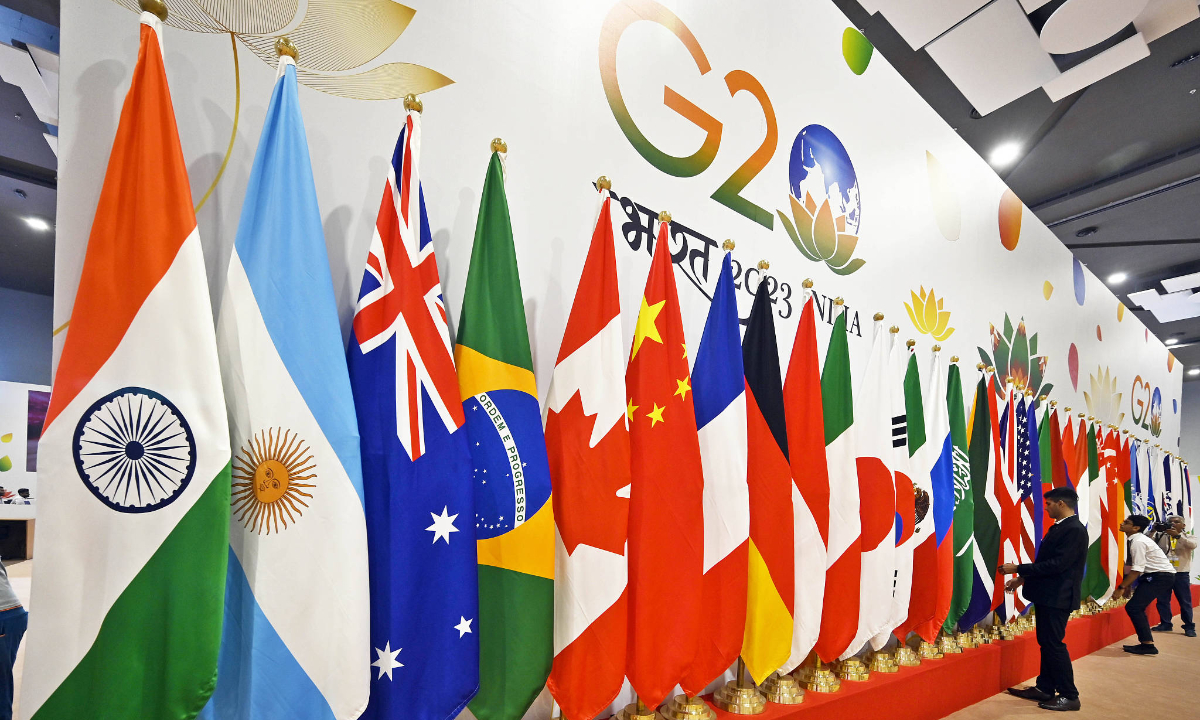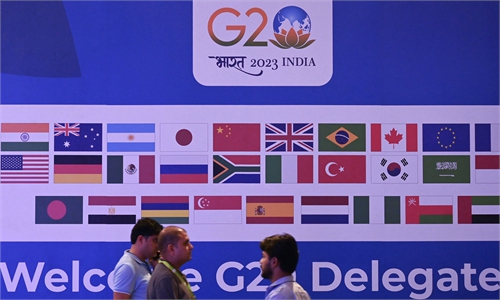Premier Li calls for G20 solidarity and cooperation as summit is held amid rising divergences among major powers

G20 Photo:VCG
The leaders and representatives of the 20 most powerful economies of the world have gathered in New Delhi, India, amid growing divergences among major powers on issues such as the Russia-Ukraine conflict, global economic recovery, food crisis and climate change.
The welcoming inclusion of the African Union (AU) as a permanent member of the G20 is the first encouraging sign that reflects consensus among major powerful economies, but the concerns about the lack of unity and the difficulty of reaching a joint declaration are still exist.
Chinese Premier Li Qiang called on Saturday for Group of 20 countries to adhere to solidarity and cooperation, strengthen coordination of macroeconomic policies to deliver confidence and impetus for glowing economic growth.
Li made the remarks while addressing the first phase of the 18th G20 Summit in New Delhi, the Indian capital.
The premier noted that the destiny of humanity is interdependent and countries should respect each other, seek common ground while shelving differences and live in peace together. In the face of major crises and common challenges, no one can prosper alone, and only unity and cooperation can lead humanity to the right path, he said.
Li urged the G20 members to adhere to the original aspiration of unity and cooperation, shoulder the responsibility of peace and development during the times, and effectively strengthen coordination of macroeconomic policies to boost confidence and momentum for global economic growth.
Chinese analysts pointed out that the G20 has been established to deal with global economic crises and to discuss collective actions for resolving economic problems and boosting global economic development, but now, unfortunately, due to the decreasing consensus and rising divergences among major powers since the outbreak of Ukraine crisis and the US-launched all-out containment against China, it's increasingly becoming a platform for wrangle, and the once-productive and constructive multilateral mechanism is facing the risk of being hijacked by a few countries.
The G20 remains an important platform for international cooperation in handling global challenges, and with the increasing contributions from developing countries like China, India and African countries, the voices within the G20 are becoming more diverse, no longer dominated solely by Western perspectives. Consequently, the US is trying to regain control over the multilateral mechanism and use it to serve its strategy of great power competition, but the international community won't welcome this attempt, experts said.
Constructive role
China will unswervingly deepen reform and expand opening-up to promote high-quality development, and advance the Chinese-style modernization, Premier Li said.
The premier assured the leaders at the meeting that China enjoys a bright prospect for its development, and will inject more new impetus into global economic recovery and sustainable development.
"We are willing to join hands with all parties to make greater efforts and contributions for our common Earth, common home and for the common future of humanity," he said.
Although Western media are trying to hype the topic about China's attitude toward the summit and the divergences between China and the host India on issues like border disputes, G20 Sherpa Amitabh Kant spoke to Indian media News9 on August 22, saying that China is "a multilateral player in G20," and "China has played a constructive role in the G20."
China will keep playing this role in the G20 despite the West-launched politicization is weakening the mechanism, in an attempt to ensure the multilateral platform remains representative and focused on global governance, rather than being hijacked by geopolitical conflicts, analysts said.
The G20 was consist of 19 countries and the EU, and now the AU has also been included, making the group now the "G21." China has made efforts to realize this expansion for some time.
Mao Ning, a Chinese Foreign Ministry spokesperson, said on Thursday that "China is the first country that explicitly expressed its support for the African Union's membership in the G20," and "China supports the AU in playing a bigger role in global governance."
Rahamtalla M. Osman, Permanent Representative of the AU to China, told the Global Times in an exclusive interview in 2022 that the AU appreciates China's and Indonesia's support for the AU to join the Group of 20 at the G20 Leaders' Summit in Bali, Indonesia.
Wrangling over Ukraine crisis
The escalating conflict between the West and Russia, as well as the divergences between Western countries and non-Western countries, posed challenges for the G20 host Indonesia in 2022, and it's now troubling this year's host, India. .
According to TASS on Friday, "the G7 countries are putting pressure on India in attempts to have their unilateral approaches to the situation in Ukraine reflected in the final documents of the G20 summit," the Russian Foreign Ministry said in a news release ahead of the upcoming participation of Russian Foreign Minister Sergey Lavrov in the G20 summit.
"The G7 countries (primarily the US, Britain, Germany and France) are putting pressure on India, trying to have their unilateral approaches to the situation around Ukraine reflected in the final documents of the G20 events," the Russian Foreign Ministry said.
On Saturday, according to Reuters, delegates of the G20 members have reached "a compromise on language to describe the war in Ukraine," a source with knowledge of the discussions said.
Indian Prime Minister Narendra Modi inaugurated the meeting on Saturday by calling on members to end a "global trust deficit" and announced that the bloc was granting permanent membership to the AU in an effort to make it more representative.
Li Haidong, a professor at the China Foreign Affairs University, told the Global Times on Saturday that "The G20 plays a crucial role in preventing fundamental divisions in addressing global economic security and climate issues. This means that economic interests and security are inseparable, and that the Earth is a shared home for everyone."
"All G20 countries should work together to create a safer, more prosperous, and more peaceful world. The biggest problem in the current international situation is the division among major powers, primarily caused by the US. It has been involved in conflicts with Russia and China, starting with the Ukraine crisis and now instigating crises in the Asia-Pacific region, such as the Taiwan Straits and South China Sea," Li noted.
The primary task of the G20 is to overcome this division and ensure the realization of the universally interconnected principles of global economic integration and security, Li said.
Danger of dysfunction
Lin Minwang, a professor at the Institute of International Studies at Fudan University, told the Global Times on Saturday that the G20 summit this year has some topics which may not be friendly to China, including discussions on the debt of developing countries.
"US-led Western countries have long propagated the disinformation about 'debt trap diplomacy,' and this time they will place renewed pressure on China, and as the host India is willing to cooperate with the US on this topic, the conclusion of this topic at the summit this time is unlikely to be fair for China," Lin said.
The fact has reflected that the divergences and confrontation within the G20 are increasing, rendering the platform less functional. In the past, many international mechanisms have faded into irrelevance because of dysfunction, and now, to be honest, the G20 is also beginning down this path, Lin observed.
Nevertheless, the G20 is still important for global governance, and with the AU becoming the permanent member of the group, it has become even more representative. It's significant to participate in the event to listen to the voice of international community and have China's voice heard in the summit, and Premier Li's remarks further solidified China's constructive role within the group, experts noted.


